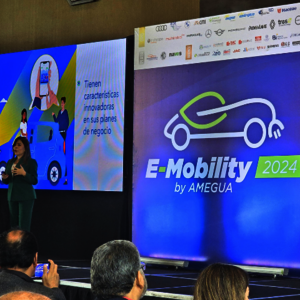Bridge built with CABEI loan streamlines traffic in Costa Rica

US$340 million credit line for road infrastructure development in Costa Rica.
San José, May 31, 2017 (AFP SERVICES/CABEI) – Since its reopening on May 24, the structural rehabilitation of the Alfredo González Flores bridge over the Virilla River, which is located on the General Cañas highway, has contributed to speeding up traffic on the most important highway in Costa Rica.
This is the first executed project of the Road Infrastructure Strategic Works Program, which is funded with a US$340 million loan provided by the Central American Bank for Economic Integration (CABEI) to the National Highway Council (CONAVI) to modernize Costa Rica’s road infrastructure.
The Alfredo González Flores Bridge is located on a strategic route that leads from San José to the Juan Santamaría international airport and to the country’s northern and Pacific areas. Approximately 100,000 vehicles use the highway daily. After presenting serious structural problems, the bridge was completely renovated and expanded from four to six lanes, with an investment of US$13.6 million.
The work involved reinforcing the structure to extend its useful life to at least 80 years. In addition to its expansion and reinforcement, the bridge was equipped with new columns, which doubled its load capacity. Other improvements included the expansion to six lanes and the installation of a new bearing system.
CABEI Country Manager for Costa Rica, Mr. Mauricio Chacón, stated that, "This type of intervention demonstrates CABEI's commitment to provide financial solutions and support modernization and institutional strengthening processes that favor the development of the country’s productive capacity."
In this case, the program seeks to overcome the lags in terms of road infrastructure. Mr. Chacón explained that the US$340 million loan program includes a series of projects, such as the construction of the Circunvalación Norte route in San José and the reinforcement and expansion to four lanes of two more bridges located over the Virilla River; route 32, which leads to the Caribbean; route 147, in Lindora (west of San José); and three overpasses in the capital city.
The overpasses are located above the roundabouts known as Garantías Sociales, de la Bandera and the Guadalupe intersection. The additional work included in the credit line involves the access route to the new container terminal in Moín, located in Puerto Limón, which is Costa Rica’s main port terminal in the Caribbean.
Mr. Chacón, stated that, "These initiatives are key for the development of Costa Rica, which is why it is important for CABEI to efficiently complete the works with regard to terms and quality. In addition to supporting the structuring of projects, the Bank also monitors and evaluates the development of interventions, not only as a source of data, but to guarantee that its support contributes to growth and to achieving higher levels of efficiency and effectiveness."
For his part, CABEI Director for Costa Rica, Mr. Alberto Cortés Ramos, commented that, “For CABEI, it is of great importance to support Costa Rica in the execution of strategic works, such as the improvement of its road infrastructure in order to overcome a lag of several decades. In the past, this type of work was also carried out with Costanera Sur and Route 27, which connects San José to the Caldera port in the Pacific.
He added that, "The vehicle fleet has been increasing massively during the last 50 years, while the road infrastructure maintained a 30-year lag.” CABEI is committed to attend the development of projects in order to modernize the road network, in addition to promoting projects with environmental sustainability approaches aimed at improving public transportation, which will directly benefit the quality of life of Costa Ricans.
The US$340 million credit line to Costa Rica is part of CABEI's regional development programs. The Bank was founded in 1960 with the aim of improving competitiveness, social development and regional integration.
Since its founding, CABEI has provided US$4.9 billion in credits for the development of productive infrastructure, which has led to the pavement of approximately 4,100 kilometers of highway (four percent of the Central American highway network) and to the expansion and reconstruction of 6,000 kilometers of highway.
Although most of CABEI’s credit portfolio is located in the region’s public sector, including Panama, Belize and the Dominican Republic, it has also financed projects in Colombia, Argentina and Mexico, according to Mr. Cortes.





